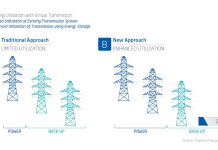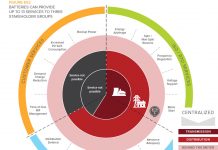Tom Konrad CFA
 |
| Nightmare or business opportunity? A Lishen-branded Ultracapacitor, with Maxwell electrode. Photo credit: Wedbush |
On May 25, research firm Wedbush released the green stock investor’s worst nightmare. That is the specter of Chinese competition.
- Why are solar stocks down 75% (as measured by the Guggenhein Solar ETF, NYSE:TAN) since the start of 2011? Chinese competition, leading to overcapacity and an industry where most companies are losing money, even on greatly increased volumes.
- Why are wind stocks down41% (as measured by the First Trust Global Wind Energy ETF, NYSE:FAN) since the start of 2011? Again, increased production capacity from Chinese producers.
To be fair, another factor in the decline of Solar and Wind stocks has been reduced subsidies in the US and Europe. Yet other green tech industries (such as LEDs and Demand-Response) have seen similar price erosion without losses of subsidies, meaning the competitive environment is more important to the profitability of these industries than the subsidy regime.
Intellectual Property Nightmares
Even worse than the fear of competition is the fear that a Chinese partner will reverse-engineer or steal your technology. That’s exactly what happened to AMSC (NASD:AMSC, then known as American Superconductor) when it turned out the company’s biggest customer, Sinovel had stolen its intellectual property, in addition to refusing to pay for products AMSC had already delivered.
While investors were already wary of increased competition in Maxwell’s ultracapacitor (UCap) business, Wedbush unlocked investor’s nightmares with a research note dated May 25th. It said,
Industry sources indicate Lishen has been selling Lishen-branded UCaps and modules directly to Chinese customers in Wind and other markets, which we believe goes around the spirit of the original outsourcing agreement with Maxwell. We had heard Lishen was working with Gore UCap electrode even before the initial 2007 outsource manufacturing agreement with Maxwell. We are now more cautious on evidence of Lishen’s direct sales activity (even though it appears Lishen may possibly be using MXWL electrodes) and suggestions Lishen is actively working to develop its own electrode.
This clearly spooked investors, and already-depressed MXWL shares have fallen another 15% since Wedbush’s research note. A small part of the decline may have been due to a downgrade by The Street, but that latter downgrade was based in large part on market price and earnings trends, meaning that it did not really reflect a change in investor attitudes. The Street’s downgrade was more The Street catching up to the stock market reality, while the Wedbush note introduced truly new information to the market.
Maxwell’s Competitive Edge
Is Lishen the Sinovel to Maxwell’s American Superconductor? Probably not, or at least not yet. In a phone interview, Wedbush analyst Craig Irwin said, “Maxwell is most likely not at risk of being outcompeted.”
According to Maxwell CEO David Schramm, Maxwell’s competitive advantage lies in its unique dry process for manufacturing ultracapacitor electrodes, not the ultracapacitor assembly itself. This process is protected by 12 patents, with another 29 pending. The dry process has much lower capital and energy costs than other companies’ wet processes, and he believes it would be very hard to reverse engineer by looking at the electrode ingredients.
Maxwell’s profit is built into the price at which is sells electrodes to cell assemblers like Lishen; Maxwell makes money from these electrode sales if they buy back the assembled UCaps, or if Lishen sells Lishen-branded Ucaps. Further, the more UCaps Lishen sells, the lower the mark-up that Maxwell has to pay for the UCaps they buy from Lishen, although Lishen-branded sales are “only a rounding error” according to Schramm.
The Maxwell-Lishen Agreement
Further, Schramm says that the sale of Lishen-branded UCaps does not go “against the spirit of the original outsourcing agreement,” as the Wedbush research note states. He says that the agreement always included a clause which allows Lishen to sell own-branded UCaps only in China, and only to customers that Maxwell is unable to sell to because of local content rules or other legal restrictions.
Schramm went on to say that he has long experience dealing with China, works very closely with Lishen, and has a personal relationship Lishen’s CEO, Mr. Qin.
Yes, But
Despite all these assurances from Schramm, Irwin has concerns. He said,
[Maxwell needs] to be very careful not to make mistakes. I believe it is a mistake to allow Lishen to sell own-branded capacitors.
In other words, the record shows that working with the Chinese around intellectual property can be very tricky. Schramm may be overconfident, and that overconfidence may be leading him to put too much faith in his China experience and his relationship with Qin.
What about the disagreement about what “goes against the spirit” of Maxwell’s agreement with Lishen? The company is telling anyone who asks that Irwin did not do his homework by checking before publishing his research report. But an analyst’s obligation is to the investors who pay for his research, not to the company he is researching.
When Irwin found out about the Lishen-branded UCaps, it went against what he believed about the agreement based on numerous analyst calls and conversations with Maxwell over the proceeding years. Those conversations had led him to believe that the agreement with Lishen was “ultracapacitor outsource manufacturing only.”
Irwin had based his previous analysis of the company on this understanding, and when he
found that this understanding was incorrect, he revised it to incorporate the increased risk he now sees. His obligation to Wedbush’s subscribers was to disseminate his new opinion in a timely manner, not to check with the company unless he thought they might have something useful to tell him.
Regardless of whether the original agreement allowed Lishen-branded capacitors or not, Irwin’s perception of the agreement changed, and so he lowered his rating of the company.
Conclusion
Maxwell is not at high risk of Lishen or a Chinese competitor stealing or reverse engineering their technology. Schramm and Irwin agree on this point. Investors selling because of fear of Chinese competition and intellectual property theft are misguided.
The difference between Schramm and Irwin lies in their level of confidence.
Irwin sees increased risk from allowing Lishen to develop its own ultracapacitor supply chain. Schramm sees only upside.Irwin thinks Maxwell is worth $8 a share (his recent price target), while SEC filings show that Schramm and other insiders have been buying since the stock fell below $10.50. The only difference is that Schramm thinks MXWL is massively undervalued at the current price of $6.50, while Irwin thinks it’s only somewhat undervalued.I fall somewhere in between. When the stock first fell to $10, I thought it was a steal. But Irwin makes some good points. I’ve long been nervous about dealing with China, and while Maxwell’s intellectual property is much safer than AMSC’s, there is risk.
A bigger concern is the demonstration that Schramm plays his cards very close to his chest. He told me directly that there are other business dealings he could not tell me about which are “very advantageous” for Maxwell.
Schramm is asking investors to trust in his experience and judgement. Perhaps that trust would be well placed, perhaps it wouldn’t. Schramm’s confidence may be justified, or he may be overconfident. We have no way to judge, in part because he keeps so much of Maxwell’s strategy private. There are doubtless some competitive advantages to this lack of transparency. There are also costs for investors trying to value the stock.
That said, if I had not not already bought the stock at $9 and $10, I would be buying now.
Disclosure: Long MXWL
This article was first published on the author’s Forbes.com blog, Green Stocks.
DISCLAIMER: Past performance is not a guarantee or a reliable indicator of future results. This article contains the current opinions of the author and such opinions are subject to change without notice. This article has been distributed for informational purposes only. Forecasts, estimates, and certain information contained herein should not be considered as investment advice or a recommendation of any particular security, strategy or investment product. Information contained herein has been obtained from sources believed to be reliable, but not guaranteed.







